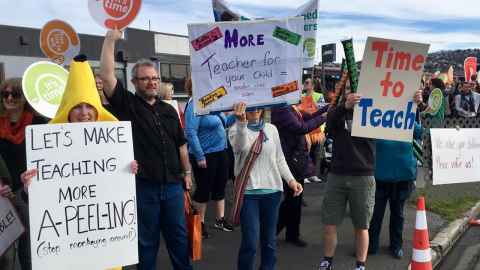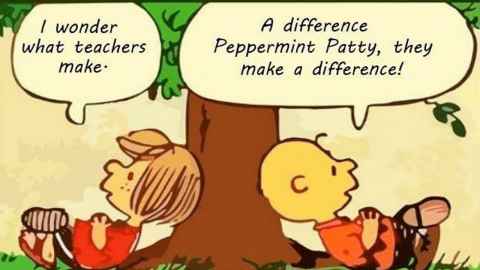Teachers are not glorified babysitters
18 December 2018
Opinion: With schools out for summer but the teachers’ dispute still not settled, second-year primary teaching student Letitia Farmer reflects on the role of teachers and the campaign to recognise their value.

Those of us who haven’t been living under a rock must be fully aware by now that teachers in Aotearoa have hit a rock wall. They have struggled with burgeoning class sizes, increasingly diverse needs of their students, extra pressure of the required standards that shall no longer be named, more and more students arriving at school unable to speak either te reo or English, and more.
So I find it sad that while so many people support the teachers’ strikes around the country, it somehow seems to keep being brought back to the money and the holidays. Now, admittedly when I was at school I thought teaching seemed like a pretty great job, no weekends, all those holidays, and the job can’t be that hard really?
Then I left school, got a job and started thinking about life in a far more open way. At some point I became aware that teachers can’t possibly have all that free time that I had previously thought they had. Because if they did, then that meant that the homework-marking fairies and the classroom-decorating elves must really exist too, not to mention the book-returning gnomes and the lesson-planning dwarves.
But that’s all right because they get paid well and have support. Oh, hold on, that was the 1970s when teachers were regarded for the professionals that they were, and still are.
Teachers need genuine support, support to help with the ever growing pressures being placed upon them, by a society that seems to have stopped seeing them as the crucial part of our children’s lives that they are.

So perhaps it is time to stop treating teachers like glorified babysitters (that require years of university study), and stop relying on the tired old fallback of “They do it because they want to make a difference” as a way of avoiding the real issues. We (I include myself in this category, because I still want to be a teacher once I graduate) want to make a difference, but we also want to make a decent living, and spend time with our own families too. We need help, we are asking for help, and we feel like we are being told we don’t deserve help.
Meanwhile we are helping to educate the next generation: our future doctors, builders, lawyers, taxi drivers, store clerks, business owners, pilots, electricians, teachers, politicians, parents, scientists, bakers...the list goes on... all roles that are pretty important to society. You have to agree that it is pretty important for all of our futures for young people to gain the best possible education that they can.
A necessary part of that is acknowledging the hard work of New Zealand’s teachers and supporting them, not just by throwing a tiny bit of money at them and saying the rest of the country would love to get a pay rise like that. Teachers need genuine support, support to help with the ever growing pressures being placed upon them, by a society that seems to have stopped seeing them as the crucial part of our children’s lives that they are.
My decision to train to be a teacher in New Zealand was not made lightly, and my achievements thus far have not always come easily, but I know that I am part of something amazing – the future.
As teachers we do get to share in the laughter and the fun; we get to form lasting bonds and friendships, and basically do one of the most important jobs in the world. I am proud to be working towards being a teacher in this wonderful country and I am proud of the wonderful men, women and children I will have the pleasure of working with in the future. My decision to train to be a teacher in New Zealand was not made lightly, and my achievements thus far have not always come easily, but I know that I am part of something amazing – the future.
Letitia Farmer is about to enter her third year studying a Bachelor of Education (Teaching) Primary specialisation. She is on the executive of the Education Social Work Student Association (ESSA). These are her personal views.